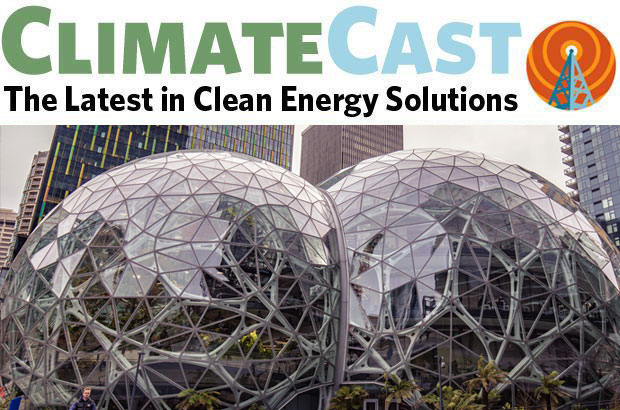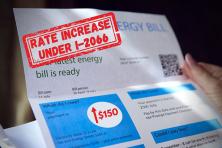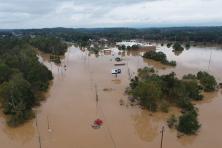Ratcheting down tailpipe emissions
This week, EPA Administrator Michael Regan proposed a new set of auto emissions rules which would dramatically accelerate the nation’s transition to zero-emission vehicles. Under the new rules, significant percentages of new vehicles would be all-electric by 2032—including at least two-thirds of new cars, nearly half of new medium-duty vehicles such as delivery vans, and a quarter of new heavy trucks. If implemented, the proposal will surpass President Biden’s stated goal to have half of all new vehicle sales be electric by 2030. It will cut tailpipe pollution—the largest source of carbon emissions—by a whopping 56% and will jumpstart a transformation of the U.S. auto industry.
The proposed rules arguably fall short of what is needed in certain areas, calling for a less comprehensive transition to electric heavy trucks and buses. In fact, truck manufacturers including Daimler and Volvo have already announced clean vehicle manufacturing plans that go further than the new EPA proposal. And some states have enacted still-stronger programs to phase out polluting vehicles, such as the Advanced Clean Cars II policies adopted by California, Oregon, and Washington, which will end the sale of new gas-powered cars by 2035. All three West Coast states are also leading the way towards electrification of medium- and heavy-duty truck fleets through their Advanced Clean Trucks rules, establishing requirements to dramatically increase sales of electric zero emission trucks and buses.
Amazon’s glass house
Noting that "the level of hypocrisy here would be hilarious" if it were not true, early April national news broke that behind the scenes of their public climate pledges, Amazon lobbied to kill legislation in Oregon that would set tech companies on a path to power data centers and crypto-currency mines with 100% clean energy by 2040—the same targets the state of Oregon set for utilities. Data centers can demand energy equal to a small city. Noted the lead state legislator on the effort, “From the very first moment we started talking about this bill, Amazon started organizing against it,” said Oregon state Rep. Pam Marsh, a co-sponsor of HB2816.
Soon after the same week, the company announced a deal with the local public utility for more renewable energy. Yet at the same time, documents show the company's intention of expanding the use of fossil-fuel-powered fuel cells for their expanded data center plan in the state and plans to tie into the proposed expansion of the cross-state GTN gas pipeline. Their proposal cuts against what other tech companies have done in Oregon, and even the solar project Amazon has built on the East Coast for another data center. Climate Solutions' Joshua Basofin comments: “It appears they failed to give thorough consideration to developing or investing in renewable energy, as other tech companies have done in Oregon, and Amazon itself has done in Virginia.” Next, the proposed data centers will face agency permitting processes this spring.
In the Northwest: ambitious, aggressive, and in new territory
The Northwest has been a quiet center for aggressive climate policymaking over the past five years, passing laws promoting clean grids, cleaner fuels, economy-wide carbon reductions, and clean buildings. Now in both Oregon and Washington, the rubber is meeting the road as emitters, businesses, utilities, and lawmakers grapple with the positive gains and ambitious requirements set by these transformative climate laws. The Washington legislature has been working to allocate monies from the state’s cap-and-invest program (Climate Commitment Act); the first quarterly auction generated over $300 million in new revenue for state clean energy and pollution-reducing programs. But calls for accountability in how lawmakers direct these new funds have grown throughout the 2023 legislative session, and a final state budget won’t be determined until April 24.
New reports in Oregon show that despite climate laws, the state is falling further behind on its climate goals. While the state might meet its existing 45% emissions-reduction goal by 2035, that goal is now outdated. Oregon’s utilities have responded to upcoming requirements very differently—while Portland General Electric is going public with its plans and considerations for its clean energy transition, NW Natural has been a vocal, vociferous opponent of electrification and action to clean up buildings’ energy usage.
One thing you can do
Live in WA? It’s the final week of budget negotiations in the 2023 legislative session. Help ensure that low- and middle-income households can access heat pump rebate dollars and let your legislator know clean buildings is a critical climate issue by clicking here and let legislators know that the medium- and heavy-duty zero emission vehicle transition is a topline climate priority by clicking here.
Live in OR? Oregon urgently needs climate action to make our homes and buildings healthy, affordable, and resilient, with less pollution. Sign up to be a community lobbyist on Building Resilience Lobby Day, taking place April 20 at the capitol in Salem.





